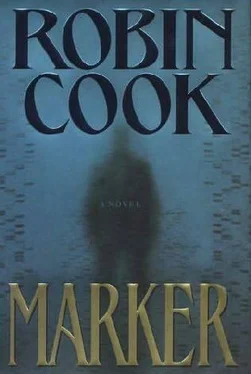Robin Cook - Marker
Здесь есть возможность читать онлайн «Robin Cook - Marker» весь текст электронной книги совершенно бесплатно (целиком полную версию без сокращений). В некоторых случаях можно слушать аудио, скачать через торрент в формате fb2 и присутствует краткое содержание. Жанр: Триллер, на английском языке. Описание произведения, (предисловие) а так же отзывы посетителей доступны на портале библиотеки ЛибКат.
- Название:Marker
- Автор:
- Жанр:
- Год:неизвестен
- ISBN:нет данных
- Рейтинг книги:5 / 5. Голосов: 1
-
Избранное:Добавить в избранное
- Отзывы:
-
Ваша оценка:
Marker: краткое содержание, описание и аннотация
Предлагаем к чтению аннотацию, описание, краткое содержание или предисловие (зависит от того, что написал сам автор книги «Marker»). Если вы не нашли необходимую информацию о книге — напишите в комментариях, мы постараемся отыскать её.
The master of the medical thriller returns with his most heart-pounding tale yet.
Twenty-eight-year-old Sean McGillin is the picture of health, until he fractures his leg while in-line skating in New York City 's Central Park. Within twenty-four hours of his surgery, he dies.
A thirty-six-year-old mother, Darlene Morgan, has knee surgery to repair a torn ligament in her knee. And within twenty-four hours, she has died.
New York City medical examiners Dr. Laurie Montgomery and Dr. Jack Stapleton are back, in Robin Cook's electrifying twenty-fifth novel. Last seen in Vector, the doctors confront a series of puzzling hospital deaths of young, healthy people after successful routine surgery.
Despite institutional resistance from her superiors, as well as from those at Manhattan General, Laurie doggedly pursues the investigation. Though it seems impossible to determine why and how the patients are dying, she comes to suspect that not only are the deaths related-they're intentional, suggesting the work of a remarkably clever serial killer with a very unusual motive, involving frightening ties to both developing genomic medicine and the economics of modern-day health care.
Then Laurie is dealt a double blow: While coping with Jack's inability to commit to their relationship, she discovers she carries a genetic marker for a breast-cancer gene. As her personal life continues to unravel, the need for answers becomes more urgent, especially when Laurie is pulled into the nightmare as a potential victim herself. With time winding down, she and Jack race to connect the dots-and save Laurie's life.
With his signature blend of suspense and science, Robin Cook delivers an electrifying page-turner as vivid as today's headlines.
Twenty-eight-year-old Sean McGillin is the picture of health, until he fractures his leg while in-line skating in New York City 's Central Park. Within twenty-four hours of his surgery, he dies.
A thirty-six-year-old mother, Darlene Morgan, has knee surgery to repair a torn ligament in her knee. And within twenty-four hours, she has died.
New York City medical examiners Dr. Laurie Montgomery and Dr. Jack Stapleton are back, in Robin Cook's electrifying twenty-fifth novel. Last seen in Vector, the doctors confront a series of puzzling hospital deaths of young, healthy people after successful routine surgery.
Despite institutional resistance from her superiors, as well as from those at Manhattan General, Laurie doggedly pursues the investigation. Though it seems impossible to determine why and how the patients are dying, she comes to suspect that not only are the deaths related-they're intentional, suggesting the work of a remarkably clever serial killer with a very unusual motive, involving frightening ties to both developing genomic medicine and the economics of modern-day health care.
Then Laurie is dealt a double blow: While coping with Jack's inability to commit to their relationship, she discovers she carries a genetic marker for a breast-cancer gene. As her personal life continues to unravel, the need for answers becomes more urgent, especially when Laurie is pulled into the nightmare as a potential victim herself. With time winding down, she and Jack race to connect the dots-and save Laurie's life.
With his signature blend of suspense and science, Robin Cook delivers an electrifying page-turner as vivid as today's headlines.













